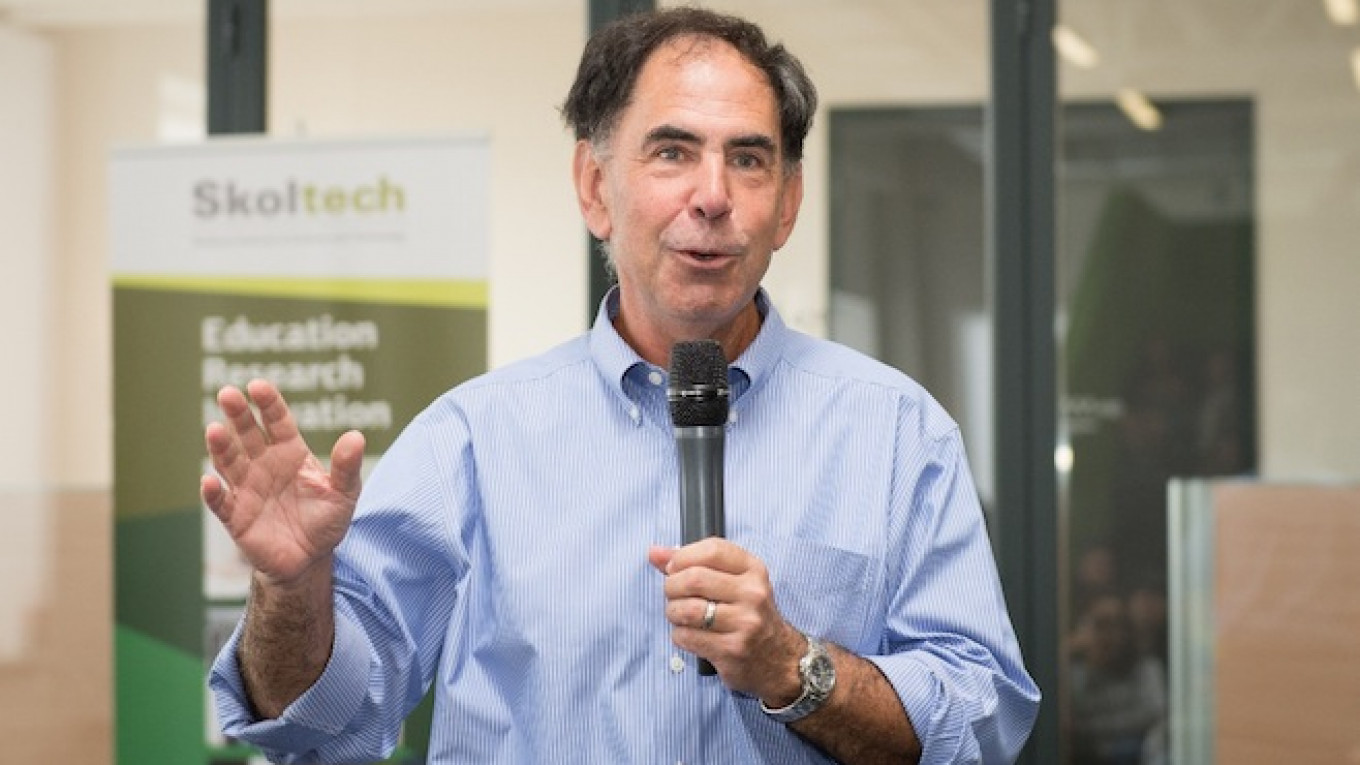After four years at the helm of one of Russia's most high-profile applied research universities, Massachusetts Institute of Technology (MIT) professor Edward Crawley will step down and return to the United States, according to a letter obtained by The Moscow Times on Tuesday.
Crawley, a member of several senior NASA advisory councils and an aerospace engineering professor, was one of the co-founders of the Skolkovo Institute of Science and Technology, or Skoltech, when it launched under MIT's tutelage in 2011. He has served as its guiding hand ever since.
The brainchild of then-President Dmitry Medvedev, who wanted a Russian analogue to Silicon Valley in a west-Moscow suburb, Skoltech has spearheaded Russia's innovation and economic modernization effort. The university is located on the grounds of a larger science, technology and innovation hub known as Skolkovo, which includes business incubators and an investment fund.
In a letter sent to Skoltech faculty and students on Friday, Crawley said he would return to MIT “and take on a role there helping to further develop its innovation system,” but that he “will continue to be a proud member of the Skoltech community.”
The resignation is not expected to disrupt the Russian university's relationship with MIT. According to the RBC news agency, the two universities plan to sign an agreement extending their cooperation for another three years.
Crawley's unexpected exit provoked rumors of tensions at the institute. RBC reported late Monday evening that the departure was connected to the professor's failing performance since the start of the Ukraine crisis in early 2014. The report cited two unidentified sources at Skoltech and the Skolkovo Foundation — the managing body of the broader Skolkovo project.
Western sanctions on Russia have not targeted Skolkovo, but the university has lost foreign faculty. According to RBC, Dutch professor Anton Berns left the university following the downing of Malaysia Airlines flight MH17 over eastern Ukraine last year.
Other universities have also been affected by the bad blood around Ukraine. In July, American professor Kendrick White was pushed out of his position as vice rector for innovation at Nizhny Novgorod's Lobachevsky State University after a prominent Russian TV host denounced White's work as an unwanted foreign influence on Russian academia.
RBC quoted one of its sources as saying about Crawley's resignation: “We understand that it is difficult to work under the conditions of [Western] sanctions, but it was hoped that Skoltech would have developed more dynamically.”
Skoltech vice president Alexei Sitnikov denied that, telling The Moscow Times that, “contrary to some allegations, this [Crawley's sudden departure] has nothing to do with sanctions, performance, or any such stuff.”
Crawley could not be reached for comment on Tuesday.
In his letter, Crawley wrote that it was time to move on from Skoltech: “I am a founder — having founded 11 companies and academic organizations. Founders have an important role: to create a vision, build an initial team and get things moving.”
Crawley wrote that the “desirable date” for his exit was before June next year to allow his successor a summer transition period.
“By that date, we will have hired nearly one-third of all planned Skoltech faculty, and likewise have built nearly one-third of the student body,” the letter said.
Deputy Prime Minister Arkady Dvorkovich, who along with Prime Minister Dmitry Medvedev has been one of Skoltech's most prominent supporters, told the Skoltech community in a letter dated Monday that Crawley would continue to work with Skoltech after his return to MIT.
“In order to provide continuity of purpose and governance I have asked Ed Crawley to remain connected to Skoltech in the role of its founding president,” Dvorkovich said in the letter, which was obtained by The Moscow Times.
“This will allow for his invaluable experience of building Skoltech in its startup stage to be shared with Skoltech leadership and community in the future,” Dvorkovich said, adding that a search committee has been formed by the board of directors and faculty to find a new president.
Contact the author at m.bodner@imedia.ru
A Message from The Moscow Times:
Dear readers,
We are facing unprecedented challenges. Russia's Prosecutor General's Office has designated The Moscow Times as an "undesirable" organization, criminalizing our work and putting our staff at risk of prosecution. This follows our earlier unjust labeling as a "foreign agent."
These actions are direct attempts to silence independent journalism in Russia. The authorities claim our work "discredits the decisions of the Russian leadership." We see things differently: we strive to provide accurate, unbiased reporting on Russia.
We, the journalists of The Moscow Times, refuse to be silenced. But to continue our work, we need your help.
Your support, no matter how small, makes a world of difference. If you can, please support us monthly starting from just $2. It's quick to set up, and every contribution makes a significant impact.
By supporting The Moscow Times, you're defending open, independent journalism in the face of repression. Thank you for standing with us.
Remind me later.






